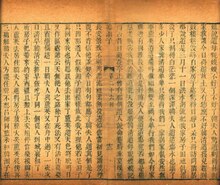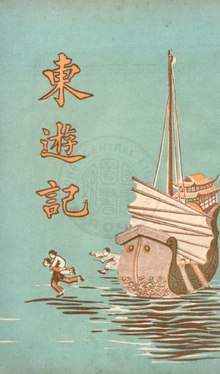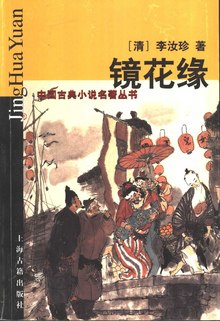Gods and demons fiction
 A late Ming printed edition ofThe Three Sui Quash the Demons' Revolt | |||||||||
| Traditional Chinese | Thần maTiểu thuyết | ||||||||
|---|---|---|---|---|---|---|---|---|---|
| Simplified Chinese | Thần maTiểu thuyết | ||||||||
| |||||||||
Gods and demons fictionorShenmo fiction(traditional Chinese:Thần ma tiểu thuyết;simplified Chinese:Thần ma tiểu thuyết;pinyin:shénmó xiǎoshuō) is asubgenreof Chinesefantasy fictionthat revolves around thedeities,immortals,demonsandmonstersofChinese mythology.The termshenmo xiaoshuo,coined in the early 20th century by the writer and literary historianLu Xun,literally means "gods and demons novel".[1]Classical works ofshenmofiction include the novelsJourney to the WestandInvestiture of the Gods.[2]
History[edit]






Shenmofirst appeared in theMing dynastyas a genre ofvernacular fiction,[3]a style of writing based onspoken Chineserather thanClassical Chinese.The roots of the genre are found in traditional folktales and legends.[4]Plot elements like the use of magic andalchemywere derived from Chinese mythology and religion, includingTaoismandBuddhism,popular among Ming intellectuals.[3]
The Three Sui Quash the Demons' Revolt(Tam toại bình yêu truyền,c.14th century CE) is an early gods and demons novel attributed toLuo Guanzhong.[5]In the story, Wang Ze begins a rebellion against the government with the aid of magic.[6]TheFour Journeys(Bốn du ký,c.16th century CE) is another earlyshenmowork composed of four novels and published during the dynasty as a compilation of folk stories.[7]The Story of Han Xiangzi(Hàn Tương Tử toàn truyền,c.17th century CE), aDaoistnovel from the same period, also shares this supernatural theme but contains heavier religious overtones.[8]
The most well known examples ofshenmofiction areJourney to the West(Tây Du Ký,c.16th century CE) andInvestiture of the Gods(Phong Thần Diễn Nghĩa,c.16th century CE).[2]Journey to the Westin particular is considered by Chinese literary critics as thechef-d'œuvreofshenmonovels.[9]The novel's authorship is attributed toWu Cheng'enand was first published in 1592 by Shitedang, a Ming publishing house.[1]The popularity ofJourney to the Westinspired a series ofshenmocopycats that borrowed plot elements from the book.[1]
Comedicshenmoof the Ming and Qing dynasties[edit]
Later works of gods and demons fiction drifted away from the purely fantastical themes of novels likeJourney to the West.Shenmonovels were still ostensibly about monsters and gods, but carried more humanistic themes. During the lateMing dynastyand earlyQing dynasty,a subgenre of comedicshenmohad emerged.[10]
The grotesque exposés of the Qing dynasty (qiangze xiaoshuo) reference the supernatural motifs ofshenmo xiaoshuo,but in the Qing exposés, the division between the real and unreal is less clear cut. The supernatural is placed outside conventional fantasy settings and presented as a natural part of a realistic world, bringing about its grotesque nature.[11]This trait is embodied in theJourney to the Westand othershenmoparodies of the late Qing dynasty.[12]InA Ridiculous Journey to the West(Wuli qunao zhi xiyouji) byWu Jianwen,the protagonist Bare-Armed Gibbon, a more venal version ofSun Wukong,aids the Vulture King once he is unable to wring any money out of a penniless fish that the vulture had caught and dropped in a puddle.[13]
The monkey returns in another Wu Jianwen story,Long Live the Constitution(Lixian wansui), and bickers with other characters fromJourney to the Westover a constitution for Heaven.[12]The four main characters ofJourney to the West,the monkey,Tang Sanzang,Zhu Bajie,andSha Wujing,travel to modern Shanghai in theNew Journey to the West(Xin xiyouji) by Lengxue. In Shanghai, they mingle with prostitutes, suffer from drug addiction, and play games ofmahjong.Journey to the Westwas not the only gods and demons novel lampooned.New Investiture of the Gods(Xin Fengshenzhuan) is a parody ofInvestiture of the Godsby Dalu that was published as aguji xiaoshuocomedy.[12]
Novels in this subgenre include an expanded revision ofThe Sorcerer's Revolt,What Sort of Book Is This?(Hedian),Romance of Devil Killing(Zhanggui zhuan), andQuelling the Demons(Pinggui zhuan). Instead of focusing only on a supernatural realm,shenmocomedies used fantasy as a social commentary on the follies of the human world.[10]Lu Xun theorized that theshenmogenre shaped the satirical works later written in theQing dynasty.[14]The genre also influenced the science fantasy novels of the late Qing.[2]
20th century[edit]
Shenmoliterature declined in the early 20th century. The generation of writers following theMay Fourth Movementrejected fantasy in favor ofliterary realisminfluenced by the trends of 19th-century European literature.[14]Chinese writers regarded fantasy genres likeshenmoas superstitious and a product of a feudal society. Stories of gods and monsters were seen as an obstacle to the modernization of China and scientific progress.[14]The writerHu Shihwrote that the spells and magical creatures of Chinese fiction were more harmful to the Chinese people than thegermsdiscovered byLouis Pasteur.Stories of the supernatural were denounced during theCultural Revolution,an era when "Down with ox-ghosts and snake-spirits"was a popular Communist slogan.[15]
Shenmoand other fantasy genres experienced a revival inTaiwan,Hong Kong, and, later, inMainland Chinaafter the Cultural Revolution ended.[15]Having returned to Chinese popular culture, fantasy has populated film, television, radio, and literature. Contemporary writers frequently use supernatural themes to accentuate the otherworldly atmosphere of their works.[16]
Etymology[edit]
The termshenmo xiaoshuowas coined by the writer and literary historianLu Xunin his bookA Brief History of Chinese Fiction(1930), which has three chapters on the genre. The literary historian Mei Chun translates Lu Xun's term as "supernatural/fantastic".[17]The term was adopted as a convention by the generations of Chinese literary critics that followed him.[9]In their 1959 translation of Lu Xun's book, Gladys Yang and Yang Xianyi translateshenmoas "Gods and Devils".[18][19]Lin Chin, a historian of Chinese literature, categorized the fantasy novels of the Ming dynasty asshenguai xiaoshuo,"novels of gods and strange phenomenon".[20]
Notable adaptations[edit]
The 1986television adaptationofJourney to the Westis one of the most well-known adaptations of the novel.
From 1996 to 2000,Ryu FujisakipublishedHoshin EngiinWeekly Shonen Jump.The story and characters were based onInvestiture of the Gods.
In August 2020, a Chinese company released a pre- Alpha gameplay video ofBlack Myth: Wukongfeaturing characters based onJourney to the West.
See also[edit]
Notes[edit]
- ^abcChun (2011),p.120
- ^abcWang (1997),p. 201
- ^abLu (1959),p. 198
- ^Lu (1959),p. 199
- ^Lu (1959),pp. 198, 419
- ^Lu (1959),pp. 176–177
- ^Lu (1959),p. 190
- ^Yang (2008),p. xxxii
- ^abYu (2008),p. 44
- ^abWang (1997),p. 205
- ^Wang (1997),pp. 183, 202
- ^abcWang (1997),p. 204
- ^Wang (1997),pp. 202–203
- ^abcWang (2004),p. 264
- ^abWang (2004),p. 265
- ^Wang (2004),p. 266
- ^Chun (2011),p. 120 note 28.
- ^Lu (1959),pp. 198–231
- ^Yang (2008),p. xxxi
- ^Yang (2008),p. xxxii
References[edit]
- Wang, David Der-wei(1997).Fin-de-siècle Splendor: Repressed Modernities of Late Qing Fiction, 1849-1911.Stanford University Press.ISBN978-0-8047-2845-4.
- Wang, David Der-wei (2004).The Monster that is History: History, Violence, and Fictional Writing in Twentieth-century China.University of California Press.ISBN978-0-520-93724-6.
- Chun, Mei (2011).The Novel and Theatrical Imagination in Early Modern China.BRILL.ISBN978-90-04-19166-2.
- Lu, Hsün (1959).A Brief History of Chinese Fiction.Translated by Yang Xianyi; Gladys Yang. Foreign Language Press.ISBN978-7-119-05750-7.
- Yang, Erzeng (2008).The Story of Han Xiangzi: The Alchemical Adventures of a Daoist Immortal.University of Washington Press.ISBN978-0-295-80194-0.
- Yu, Anthony (2008)."The Formation of Fiction in the" Journey to the West ""(PDF).Asia Minor.21(1). Academia Sinica: 15–44.JSTOR41649940.
